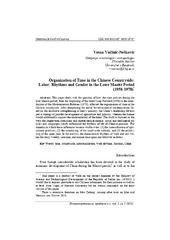Prikaz osnovnih podataka o dokumentu
Organizacija vremena na kineskom selu - fizički rad, ritmovi i pol u kasnijem periodu Maoizma (1958-1978)
Organization of time in the Chinese countryside: Labor, rhythms and gender in the later Maoist period (1958-1978)
| dc.creator | Vučinić-Nešković, Vesna | |
| dc.date.accessioned | 2021-10-12T11:03:00Z | |
| dc.date.available | 2021-10-12T11:03:00Z | |
| dc.date.issued | 2010 | |
| dc.identifier.issn | 0353-1589 | |
| dc.identifier.uri | http://reff.f.bg.ac.rs/handle/123456789/964 | |
| dc.description.abstract | Ova studija bavi se pitanjem na koji način je državna politika za vreme Maoističkog perioda, od početka Velikog skoka napred (1958) do uvođenja Modernizacijskih reformi (1978), uticala na organizaciju vremena na kineskom selu. Nakon napuštanja prvobitnog sovjetskog modela modernizacije, baziranog na ekskluzivnom jačanju teške industrije, kinesko političko rukovodstvo razvilo je strategiju paralelnog razvoja poljoprivrede i industrije, pri čemu je čak prvo trebalo dodatno da podržava modernizaciju drugog. Studija je usredsređena na načine na koje su dugoročni državni planovi i kratkoročnije ekonomske, društvene i ideološke odredbe i kampanje zajedno uticale na životne ritmove kineskih seljaka. Domeni u kojima su ovi uticaji postali vidljivi su: (1) intenziviranje poljoprivrednih praksi, (2) uvođenje sitne industrije, i (3) politizacija slobodnog vremena. U analizi se detaljno slede karakteristični ritmovi rada i odmora u okviru dnevnih sedmičnih, sezonskih i godišnjih vremenskih intervala. | sr |
| dc.description.abstract | This paper deals with the question of how the state policies during the later Maoist period, from the beginning of the Great Leap Forward (1958) to the introduction of the Modernization Reforms (1978), affected the organization of time in the Chinese countryside. After abandoning the initial Soviet model of modernization, based on the exclusive strengthening of heavy industry, the China's leadership developed a strategy of parallel development of agriculture and industry, wherein the former would additionally support the modernization of the latter. The study is focused on the ways the longer term state plans and shorter term economic, social and ideological policies and campaigns jointly influenced the rhythms of life of Chinese peasants. The domains in which these influences became visible were: (1) the intensification of agricultural practices, (2) the introducing of the small-scale industry, and (3) the politicizing of the spare time. In the analysis the characteristic rhythms of work and rest within the daily, weekly, seasonal, and annual time spans are followed in detail. | en |
| dc.publisher | Univerzitet u Beogradu - Filozofski fakultet - Odeljenje za etnologiju i antropologiju, Beograd | |
| dc.relation | info:eu-repo/grantAgreement/MESTD/MPN2006-2010/147035/RS// | |
| dc.rights | openAccess | |
| dc.rights.uri | https://creativecommons.org/licenses/by/4.0/ | |
| dc.source | Etnoantropološki problemi | |
| dc.subject | vreme | sr |
| dc.subject | selo | sr |
| dc.subject | radni ritmovi | sr |
| dc.subject | Maoizam | sr |
| dc.subject | Kina | sr |
| dc.subject | industrijalizacija | sr |
| dc.subject | work rhythms | en |
| dc.subject | time | en |
| dc.subject | Maoism | en |
| dc.subject | industrialization | en |
| dc.subject | countryside | en |
| dc.subject | China | en |
| dc.title | Organizacija vremena na kineskom selu - fizički rad, ritmovi i pol u kasnijem periodu Maoizma (1958-1978) | sr |
| dc.title | Organization of time in the Chinese countryside: Labor, rhythms and gender in the later Maoist period (1958-1978) | en |
| dc.type | article | |
| dc.rights.license | BY | |
| dc.citation.epage | 236 | |
| dc.citation.issue | 2 | |
| dc.citation.other | 5(2): 205-236 | |
| dc.citation.rank | M24 | |
| dc.citation.spage | 205 | |
| dc.citation.volume | 5 | |
| dc.identifier.doi | 10.21301/eap.v5i2.10 | |
| dc.identifier.fulltext | http://reff.f.bg.ac.rs/bitstream/id/2490/961.pdf | |
| dc.type.version | publishedVersion |

